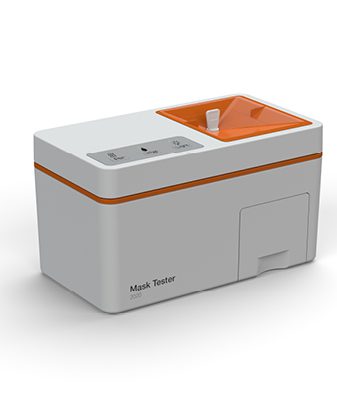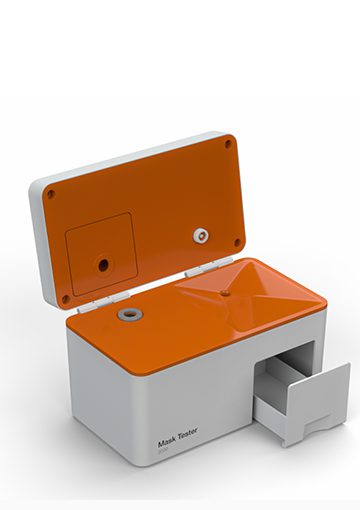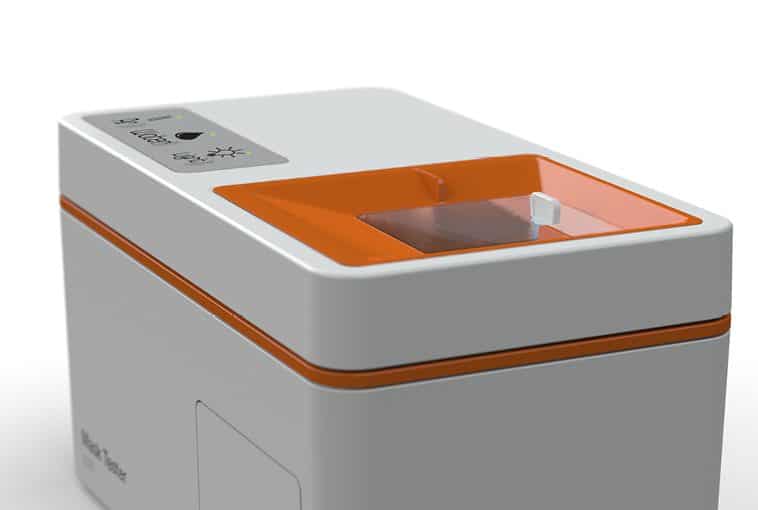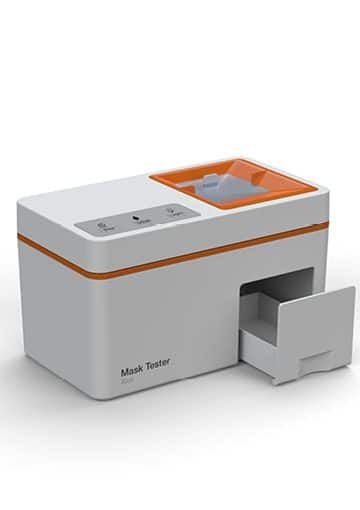Covid-19:
Mask tester

The brief
During the outbreak of Covid-19 we were being offered to purchase surgical masks from Asia. In an investigation we learnt that 200million were being made per day and in order for a mask to be a barrier to the Covid-19 virus strains they need to be certified to at least a KN95 standard. To make a mask to this standard we learnt that a mask should contain a “melt blown fabric”. To make this fabric, special machines with the correct nozzle size are required. It is highly unlikely – if not impossible - for there to be enough of these machines in circulation to make such a daily output of masks, so therefore the market is saturated with masks that do not conform to the standard but are sold as if they do.
We decided to make a simple, quick and cheap device to help organizations quickly test if their purchased masks are likely to pass a certified mask test.
The bang
Our challenge was how to give an indication that a mask could pass a certified test. Or more accurately, how could we demonstrate that a mask would not pass a certified test. Through research about the melt blown fabric used in KN95 surgical masks we learnt that we could use a set of three tests. An air pressure test, a light diffusing test and a water permeability test. (more details on the deviation and methodology can be found in our blog)
Our initial test rig delivered a good consistency of results used on different fabrics. This gave us the confidence there was a simple equivalent to the breathalyser test- but for COVID-19 masks. We developed the concept further so as it could be shared with manufacturers to obtain product and tooling costs
The result
Each test is very accurate and can easily differentiate between masks that contain melt blown fabric and masks that have their melt blow fabric removed. The device can also differentiate between other filter materials e.g. coffee filters, tissue paper and cotton. We have tried to get hold of fake masks to test their accuracy. In our blog you can see the rough test rig prototype, and we have applied a layer of industrial design to our initial development which we have costed with a number of UK and Asian manufacturers
Can we help you?
We wish we had been able to take the idea to market months ago. We are sharing this development work to illustrate our desire to be involved with the fight against viral pandemics and work alongside scientists and medics to deliver solutions to market as quickly and inexpensively as possible. We welcome enquires from anyone who believes we can be an asset to their project.




Covid-19:
Mask tester
The brief
During the outbreak of Covid-19 we were being offered to purchase surgical masks from Asia. In an investigation we learnt that 200million were being made per day and in order for a mask to be a barrier to the Covid-19 virus strains they need to be certified to at least a KN95 standard. To make a mask to this standard we learnt that a mask should contain a “melt blown fabric”. To make this fabric, special machines with the correct nozzle size are required. It is highly unlikely – if not impossible - for there to be enough of these machines in circulation to make such a daily output of masks, so therefore the market is saturated with masks that do not conform to the standard but are sold as if they do.
We decided to make a simple, quick and cheap device to help organizations quickly test if their purchased masks are likely to pass a certified mask test.
The bang
Our challenge was how to give an indication that a mask could pass a certified test. Or more accurately, how could we demonstrate that a mask would not pass a certified test. Through research about the melt blown fabric used in KN95 surgical masks we learnt that we could use a set of three tests. An air pressure test, a light diffusing test and a water permeability test. (more details on the deviation and methodology can be found in our blog)
Our initial test rig delivered a good consistency of results used on different fabrics. This gave us the confidence there was a simple equivalent to the breathalyser test- but for COVID-19 masks. We developed the concept further so as it could be shared with manufacturers to obtain product and tooling costs
The result
Each test is very accurate and can easily differentiate between masks that contain melt blown fabric and masks that have their melt blow fabric removed. The device can also differentiate between other filter materials e.g. coffee filters, tissue paper and cotton. We have tried to get hold of fake masks to test their accuracy. In our blog you can see the rough test rig prototype, and we have applied a layer of industrial design to our initial development which we have costed with a number of UK and Asian manufacturers
Can we help you?
We wish we had been able to take the idea to market months ago. We are sharing this development work to illustrate our desire to be involved with the fight against viral pandemics and work alongside scientists and medics to deliver solutions to market as quickly and inexpensively as possible. We welcome enquires from anyone who believes we can be an asset to their project.




Covid-19:
Mask tester
The brief
During the outbreak of Covid-19 we were being offered to purchase surgical masks from Asia. In an investigation we learnt that 200million were being made per day and in order for a mask to be a barrier to the Covid-19 virus strains they need to be certified to at least a KN95 standard. To make a mask to this standard we learnt that a mask should contain a “melt blown fabric”. To make this fabric, special machines with the correct nozzle size are required. It is highly unlikely – if not impossible - for there to be enough of these machines in circulation to make such a daily output of masks, so therefore the market is saturated with masks that do not conform to the standard but are sold as if they do.
We decided to make a simple, quick and cheap device to help organizations quickly test if their purchased masks are likely to pass a certified mask test.
The bang
Our challenge was how to give an indication that a mask could pass a certified test. Or more accurately, how could we demonstrate that a mask would not pass a certified test. Through research about the melt blown fabric used in KN95 surgical masks we learnt that we could use a set of three tests. An air pressure test, a light diffusing test and a water permeability test. (more details on the deviation and methodology can be found in our blog)
Our initial test rig delivered a good consistency of results used on different fabrics. This gave us the confidence there was a simple equivalent to the breathalyser test- but for COVID-19 masks. We developed the concept further so as it could be shared with manufacturers to obtain product and tooling costs
The result
Each test is very accurate and can easily differentiate between masks that contain melt blown fabric and masks that have their melt blow fabric removed. The device can also differentiate between other filter materials e.g. coffee filters, tissue paper and cotton. We have tried to get hold of fake masks to test their accuracy. In our blog you can see the rough test rig prototype, and we have applied a layer of industrial design to our initial development which we have costed with a number of UK and Asian manufacturers
Can we help you?
We wish we had been able to take the idea to market months ago. We are sharing this development work to illustrate our desire to be involved with the fight against viral pandemics and work alongside scientists and medics to deliver solutions to market as quickly and inexpensively as possible. We welcome enquires from anyone who believes we can be an asset to their project.




